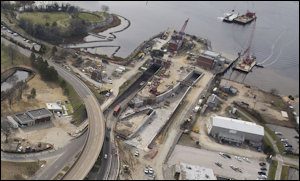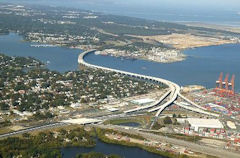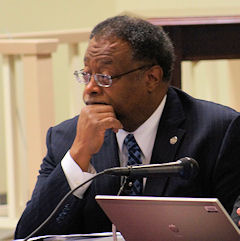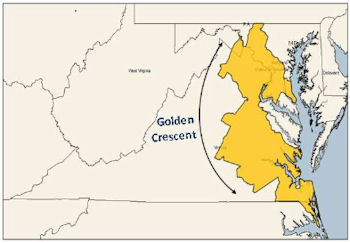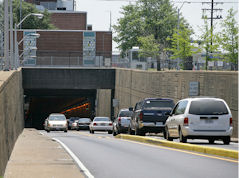
- Norfolk Midtown Tunnel. Photo credit: VDOT
by James A. Bacon
The controversy over tolls on the $2.1 billion Midtown Tunnel/Downtown Tunnel project in Hampton Roads is spreading statewide as transportation advocates in other parts of Virginia ponder the implications of what it means for them. In a missive distributed yesterday Robert Chase, president of the Northern Virginia Transportation Alliance, warned that one “rumored” scenario under consideration by House-Senate conferees would be to renege on the $2.1 billion public-private partnership agreement with Elizabeth River Crossings (ERC), even if it meant triggering multimillion-dollar penalties.
Hampton Roads legislators are up in arms over the deal, which would slap tolls on users of the two tunnels and the Martin Luther King Expressway later this year in order to finance major improvements that aren’t scheduled to be complete for two years. Two weeks ago, the Virginian-Pilot reported, Del. Chris Jones, R-Suffolk, was researching how the contract could be terminated as an option of “last resort.”
If Chase is correct, Jones’ idea has morphed from a research project into an option under consideration by House and Senate budget conferees in Richmond. Jones, as it happens, is one of the six House conferees, as is Johnny Joannou, D-Portsmouth, whose district is at ground-zero of the controversy. Under the Jones scenario, writes Chase, the state “would legislatively scrap the $2.1 billion Hampton Roads Midtown-Downtown Tunnel PPTA contract and mandate that only a new Midtown Tunnel be built entirely with state funding through over $1 billion in federal GARVEE financing.”
Needless to say, that idea won’t play well in Northern Virginia, or anywhere else for that matter. Conferees are weighing the idea of providing an additional $300 million, plus $150 million already agreed upon, to defray the cost of the Rail-to-Dulles METRO rail project in Northern Virginia, but half or more of that project financing still will be paid by commuters on the Dulles Toll Road. It’s an open question how NoVa lawmakers will cotton to an arrangement that extracts $4 tolls from Dulles Toll Road commuters for a rail service they aren’t even using while Norfolk commuters get a new tunnel for free.
Notes Chase:
Scrapping the PPTA deal would mean breaking a legally binding contract with the consortium, incurring financial penalties and totally circumventing the Commonwealth Transportation Board/state and local planning and approval processes. Not a real private-sector confidence builder for a state with virtually no construction dollars desperate to attract private sector investment. …
Virginia has already committed $400 million to the Downtown/Midtown/MLK Extension project to buy down tolls. To provide the total $1 billion (and allow Hampton Road residents a toll-free trip) the Commonwealth would have to add another $600 million in GARVEE funds or essentially all of the $1.2 billion in authorized GARVEE bond funds for the next 10-12 years to a single Hampton Roads project. (GARVEE bonds are repaid from future federal revenues meaning that about $100 million/year in future federal revenues will go to a single Hampton Roads project as opposed to being leveraged across many throughout the state.)
Transportation officials say that this would most likely kill Northern Virginia’s I-95 Express HOT Lanes project for which GARVEES are targeted and potentially several others including the Route 7/Belmont Ridge Road Interchange and the Leesburg Bypass/Sycolin Road interchange.
In sum, scrapping the ERC contract would derail the McDonnell administration’s entire transportation grand strategy, which is based upon leveraging the borrowed dollars through public private partnerships. Accordingly, the chances of the governor going along with the Jones scenario are just about zero. I would conjecture that Jones doesn’t really want to un-do the ERC deal, he’s just using the prospect of disaster as leverage to extract enough money from the state to offset tolls until the tunnels are built.
Two lines of argument would support such a bid. First, it is entirely unreasonable by any standard to ask people to pay tolls for transportation improvements they are not using. (Admittedly, that argument didn’t work for Dulles Toll Road commuters, so it may not be a strong one.) Second, if the state is forking out up to $450 million for the Rail-to-Dulles to provide toll road relief, it’s hard to argue that it can’t afford a measley $100 million or so for Hampton Roads.
Whatever happens, Virginia has reached a sad state of affairs. Billions of dollars of bond proceeds are sloshing around uncommitted. The monies are not subject to the usual transportation formulas which, though flawed, at least ensure that funds are distributed around the state in a manner roughly approximating population and need. The criteria for allocating bond monies, it appears, will be he who screams the loudest gets the most money. Political considerations will supplant economic considerations, and the results will be sub-par.
Welcome to the New Dominion.
Update: Here’s another reason why the Jones scenario of cutting the cost by building just one tunnel won’t work: The improvements to the Midtown Tunnel, Downtown Tunnel and Martin Luther King Expressway are designed to work as a network. The MLK Expressway will funnel a lot of drivers off the Interstate to the two tunnels, according to my source. The plan is to provide up-to-date info about driving conditions at both tunnels to commuters on the MLK, by signs or other means, to steer them to the least congested facility. Building the components of the plan one by one won’t deliver the same congestion-mitigation benefits.

